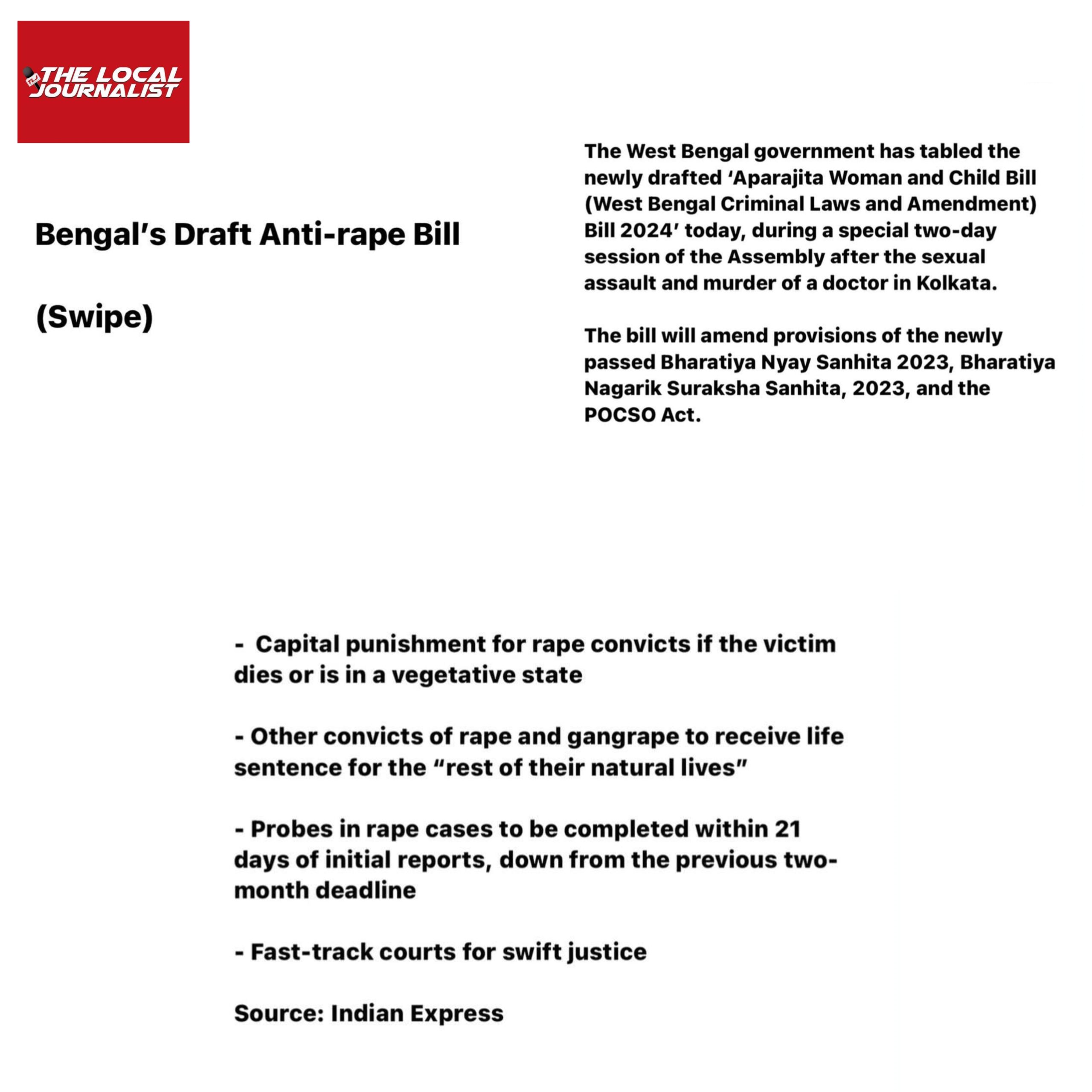
In a significant legislative move, the West Bengal Assembly passed the Aparajita Woman and Child West Bengal Criminal Laws Amendment Bill 2024. The bill was introduced following the horrific incident at RG Kar Medical College, where a young female doctor was allegedly raped and murdered, sparking widespread outrage across the state. This incident has acted as a catalyst, pushing the state government to create a robust legal framework specifically targeting sexual crimes against women and children.
The bill, named ‘Aparajita,’ was passed with unanimous support in the West Bengal Legislative Assembly, with no opposition from any party. This makes West Bengal the first state in India to introduce such a specific and stringent legal amendment, distinct from the central government’s criminal law reforms. However, for the bill to become law, it still requires the signatures of the Governor of West Bengal, CV Ananda Bose, and President Droupadi Murmu.
Key Provisions and Differences from Central Law
Chief Minister Mamata Banerjee, who has championed the bill, highlighted its three main objectives: enhanced punishment, expedited investigation, and swift justice delivery. The Aparajita Bill introduces tougher penalties compared to the provisions of the Indian Penal Code and the Protection of Children from Sexual Offences (POCSO) Act, which are part of the central government’s legal framework.
Under the central laws, the punishment for rape and gang rape ranges from 10 to 20 years of rigorous imprisonment, with the possibility of life imprisonment in severe cases. The Aparajita Bill, however, extends these penalties to include life imprisonment without parole and, in cases of aggravated crimes, even the death penalty. Specifically, the bill stipulates that if a rape or gang rape victim dies or is left in a near-death condition, the offender will face the death penalty along with a fine, marking a significant escalation in the severity of punishment.
Furthermore, the bill introduces unprecedented penalties for acid attacks. While the central laws prescribe 10 years to life imprisonment and fines, the Aparajita Bill raises the stakes to life imprisonment without parole or even the death penalty, emphasizing the state’s zero-tolerance approach to such heinous crimes.
Expedited Justice Mechanisms
In addition to harsher punishments, the Aparajita Bill places a strong emphasis on speeding up the legal process. An ‘Aparajita Task Force’ will be established to ensure that investigations into sexual crimes are conducted swiftly. The bill mandates that preliminary investigation reports must be completed within 21 days. In exceptional cases, this period can be extended by 15 days, but only with the approval of a senior police official.
The bill also sets stringent deadlines for the trial process. Testimonies in cases involving crimes against children must be completed within seven days, and special courts will be set up in every district to facilitate this. Moreover, the trial itself must be concluded within 30 days of the chargesheet being filed. This stands in stark contrast to the central laws, which allow for a one-year timeframe for the trial process, highlighting the West Bengal government’s commitment to delivering swift justice.
Financial and Institutional Support
The Aparajita Bill also addresses the need for financial and institutional support for victims. The bill incorporates provisions for the treatment of rape victims and financial assistance for their families. It draws from the Nirbhaya Fund, where the central government contributes 60% of the funds, and the state contributes 40%. Out of the total ₹108.79 crore allocated from the Nirbhaya Fund, West Bengal has received ₹81.97 crore from the central government and has contributed ₹54.55 crore from its own resources. So far, 66% of these funds have been utilized, with the state pledging an additional ₹17.98 crore to support these initiatives.
Conclusion
The Aparajita Bill represents a historic step forward in the fight against sexual violence in West Bengal. By introducing enhanced punishments, expediting the legal process, and providing financial support to victims, the state government aims to create a safer environment for women and children. As the bill awaits the final signatures needed to become law, it stands as a powerful statement of West Bengal’s commitment to justice and the protection of its most vulnerable citizens.
